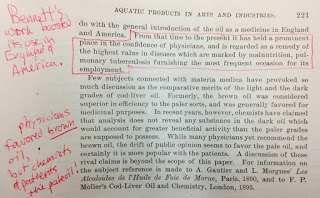If you are looking for my writings on glycation and AGEs, you should start with this article: Where Do Most AGEs Come From? O Glycation, How Thy Name Hast Deceived Me!For a more technical and comprehensive introduction, I recommend chapter 2 of my doctoral dissertation. For the importance of insulin and glucose to protect against …

Mastering Nutrition Episode 13: Wait a Second, Is Glycation Actually GOOD For You?
In this episode, I wrap up glycation week by discussing why glycation may play essential physiological roles in the body. In the early days of methylglyoxal research, Albert Szent-Gyorgyi, who won the 1937 Nobel prize in Physiology or Medicine for his discovery of vitamin C and critical steps in energy metabolism, saw the molecule …

Weighing in on the Fermented Cod Liver Oil (FCLO) Controversy
Many people have been asking me to weigh in on the controversy that is erupted this week with the publication of Dr. Kaayla Daniel’s report arguing that fermented cod liver oil (FCLO) produced by Green Pasture is rancid, low in fat-soluble vitamins, made from pollock rather than cod, and adulterated with trans fat-containing vegetable oil. …
Public Presentations to Date
Here’s a handy reference to find most of the public presentations I’ve given at conferences that are not exclusively academic in nature. Against the motion, “Don’t Eat Anything With a Face.” Intelligence Squared US debate. New York, NY. December 4, 2013. Here is the full video: Good Fats, Bad Fats: Separating Fact From Fiction. Sponsored …
How to Cook Liver and Make it Taste Not-Bad
Liver is an absolute nutritional powerhouse, nature’s multivitamin. Many people have bad experiences with liver because they don’t like the taste, but these negative experiences can be minimized by starting with high-quality, fresh liver, and then storing, preparing, and cooking it right. Tip 1: Grass-Fed Liver First off, start with grass-fed liver. It’s likely to …

Wheat Belly — The Toll of Hubris on Human Health
Dr. William Davis, Milwaukee-based “preventive cardiologist” and Medical Director of the Track Your Plaque program, argues in his new book, Wheat Belly: Lose the Wheat, Lose the Weight, and Find Your Path Back to Health, that “somewhere along the way during wheat’s history, perhaps five thousand years ago but more likely fifty years ago, wheat …